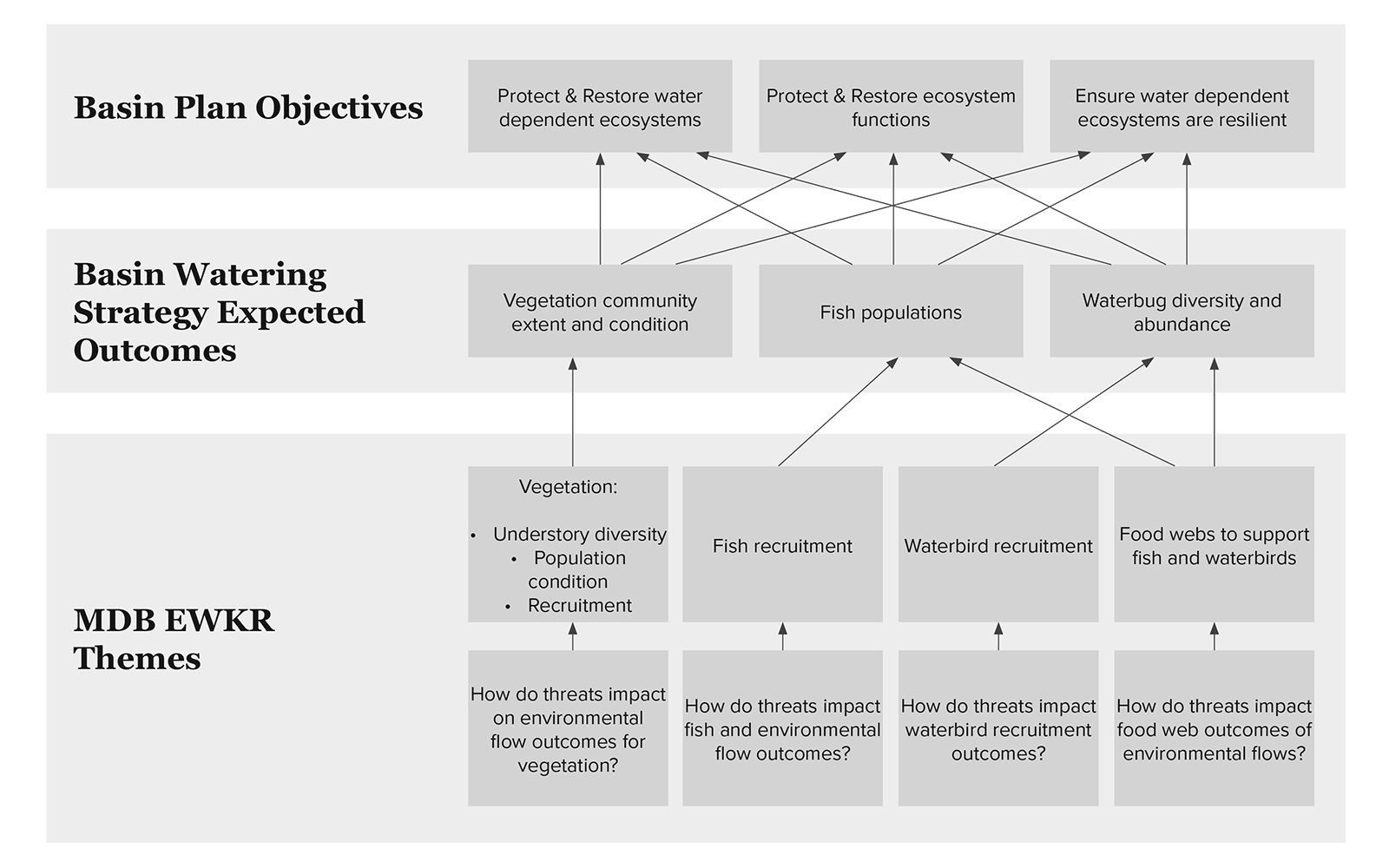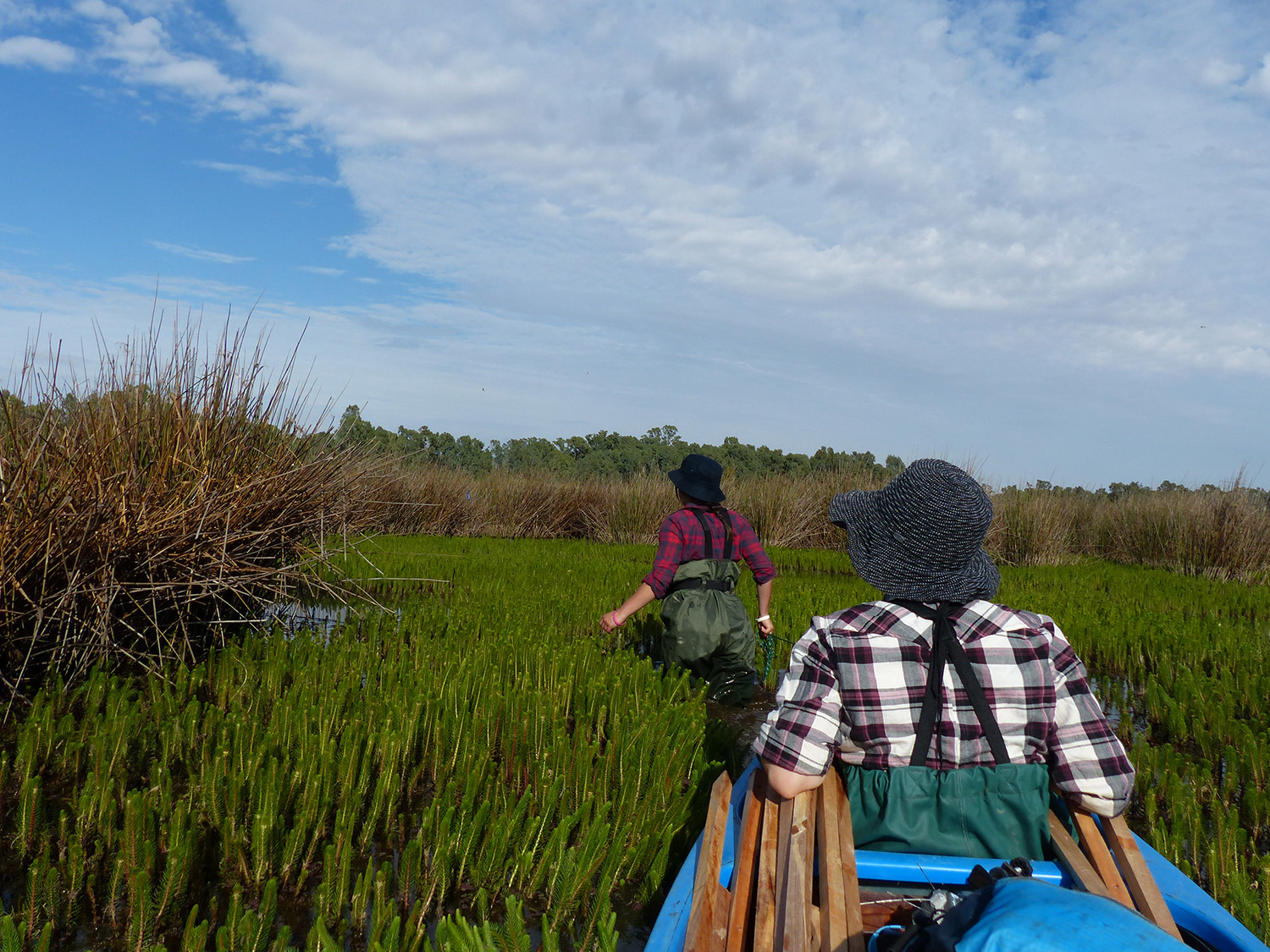We work in dynamic environments, with floods, droughts and our ‘boom and bust cycles’ making what we do complicated. Our research is rigorous, creative, and undertaken on a systematic basis to increase our shared knowledge with the many stakeholders involved in environmental water management.
Together with water managers, scientists, local communities and Federal and State Government agencies, we are improving our understanding of critical ecological processes, like fish recruitment and bird breeding, which relate to changes in flow. Understanding these processes is critical to decisions about how to allocate and manage environmental water.
The Murray-Darling Basin Plan is the policy framework within which we work, and we are committed to ensuring that we provide people with the best available knowledge to get great local and Basin-wide outcomes for fish, vegetation, waterbirds and food-webs.
Our work is funded by the Commonwealth Environmental Water Office, and we have a number of organisational collaborators helping us to achieve our goals. You can read more about them on ‘Our Collaborators’ page.
How our work fits within the Basin Plan

Making a difference
Our research is improving the ability of water agencies to assess and understand changes in ecological health over the medium to long-term. We are strengthening their operations and planning by:
- Improving our capacity to predict outcomes of environmental flow allocations over one to five years.
- Building capacity to set realistic objectives and targets for water management and other complementary activities as the climate changes.
- Improving monitoring, evaluation and reporting on progress toward the Basin Plan environmental objectives and targets.
- Building capacity to report progress on Basin Plan environmental objectives and targets.
Our work is organised around four themes: vegetation, fish, waterbirds and foodwebs, with overarching adoption and communication activities synthesising across disciplinary boundaries. Each theme has a research manager who works as part of the MDB EWKR Executive Team, made up of the people outlined in the table below:
EWKR Leadership
Team Members |
Biography |
| Nicole Thurgate Research Project Coordinator La Trobe University N.Thurgate@latrobe.edu.au. |
Nikki is an animal ecologist with a PhD from the University of New Orleans. She has undertaken research using reptiles, amphibians, butterflies and small mammals as model organisms to better understand processes contributing to extinction. She is particularly curious about the implications that multi-stage life-cycles pose for conservation of freshwater and terrestrial ecosystems. All of her research has been applied with a strong emphasis on providing scientific outcomes that inform management and policy. She has also worked in a number of positions in State and Federal government. For the last 7 years she worked with the Terrestrial Ecosystem Research Network (TERN) helping coordinate complex research projects and manage large programs. Nikki is looking forward to using her skills and experience to help provide good outcomes for Australia’s freshwater and river systems. https://scholars.latrobe.edu.au/display/nthurgate |
| Cherie Campbell Vegetation Theme Coordinator La Trobe University cherie.campbell@latrobe.edu.au |
Cherie’s main research interests relate to understanding the maintenance of aquatic and floodplain vegetation in riverine corridors, monitoring ecological responses to flow regimes, and assessing and interpreting patterns in aquatic and floodplain vegetation composition. https://scholars.latrobe.edu.au/display/cjcampbell |
| Amina Price Fish Theme Coordinator La Trobe University amina.price@latrobe.edu.au |
Amina Price is an aquatic ecologist based at The Murray-Darling Freshwater Research Centre in Wodonga, Victoria, Australia. Dr Price’s research topics of special interest include:
|
| Paul McInerney Food Webs Theme Coordinator La Trobe University p.mcinerney@latrobe.edu.au |
Dr Paul McInerney is a freshwater ecologist interested in the influence of riparian plants on stream ecology, invasive species and aquatic macroinvertebrate ecology. https://scholars.latrobe.edu.au/display/pmcinerney |
| Heather McGinness Waterbird Theme Coordinator CSIRO Heather.Mcginness@csiro.au |
Dr McGinness is an Ecologist who conducts research aiming to inform sustainable natural resource management practices. With a background in riverine and floodplain landscape ecology, her interdisciplinary work integrates aquatic and terrestrial ecology in a range of agricultural, mixed and natural ecosystems. Research areas include the effects of changes in landuse, hydrology and flooding upon biodiversity and productivity; the ecological influence of variability and connectivity in river systems and their catchments; and the adaptive management and rehabilitation of ephemeral creeks, floodplains and wetlands in multi-use landscapes. http://people.csiro.au/M/H/Heather-Mcginness |
At EWKR Story Space we enjoy sharing what we are doing with water managers, scientists and local communities. If you would like to subscribe for updates, please enter your details below.
